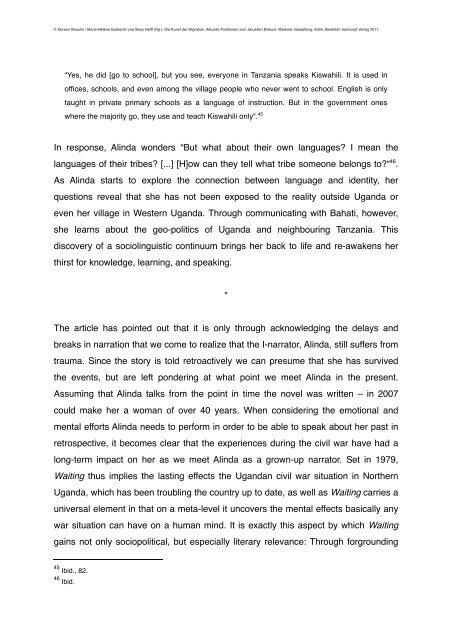Waiting – A Novel of Uganda at War - Migration & Media
Waiting – A Novel of Uganda at War - Migration & Media
Waiting – A Novel of Uganda at War - Migration & Media
Create successful ePaper yourself
Turn your PDF publications into a flip-book with our unique Google optimized e-Paper software.
© Doreen Strauhs / Marie-Hélène Gutberlet und Sissy Helff (Hg.): Die Kunst der Migr<strong>at</strong>ion. Aktuelle Positionen zum aktuellen Diskurs. M<strong>at</strong>erial, Gestaltung, Kritik, Bielefeld: transcript Verlag 2011.<br />
“Yes, he did [go to school], but you see, everyone in Tanzania speaks Kiswahili. It is used in<br />
<strong>of</strong>fices, schools, and even among the village people who never went to school. English is only<br />
taught in priv<strong>at</strong>e primary schools as a language <strong>of</strong> instruction. But in the government ones<br />
where the majority go, they use and teach Kiswahili only“. 45<br />
In response, Alinda wonders “But wh<strong>at</strong> about their own languages? I mean the<br />
languages <strong>of</strong> their tribes? [...] [H]ow can they tell wh<strong>at</strong> tribe someone belongs to?“ 46 .<br />
As Alinda starts to explore the connection between language and identity, her<br />
questions reveal th<strong>at</strong> she has not been exposed to the reality outside <strong>Uganda</strong> or<br />
even her village in Western <strong>Uganda</strong>. Through communic<strong>at</strong>ing with Bah<strong>at</strong>i, however,<br />
she learns about the geo-politics <strong>of</strong> <strong>Uganda</strong> and neighbouring Tanzania. This<br />
discovery <strong>of</strong> a sociolinguistic continuum brings her back to life and re-awakens her<br />
thirst for knowledge, learning, and speaking.<br />
*<br />
The article has pointed out th<strong>at</strong> it is only through acknowledging the delays and<br />
breaks in narr<strong>at</strong>ion th<strong>at</strong> we come to realize th<strong>at</strong> the I-narr<strong>at</strong>or, Alinda, still suffers from<br />
trauma. Since the story is told retroactively we can presume th<strong>at</strong> she has survived<br />
the events, but are left pondering <strong>at</strong> wh<strong>at</strong> point we meet Alinda in the present.<br />
Assuming th<strong>at</strong> Alinda talks from the point in time the novel was written <strong>–</strong> in 2007<br />
could make her a woman <strong>of</strong> over 40 years. When considering the emotional and<br />
mental efforts Alinda needs to perform in order to be able to speak about her past in<br />
retrospective, it becomes clear th<strong>at</strong> the experiences during the civil war have had a<br />
long-term impact on her as we meet Alinda as a grown-up narr<strong>at</strong>or. Set in 1979,<br />
<strong>Waiting</strong> thus implies the lasting effects the <strong>Uganda</strong>n civil war situ<strong>at</strong>ion in Northern<br />
<strong>Uganda</strong>, which has been troubling the country up to d<strong>at</strong>e, as well as <strong>Waiting</strong> carries a<br />
universal element in th<strong>at</strong> on a meta-level it uncovers the mental effects basically any<br />
war situ<strong>at</strong>ion can have on a human mind. It is exactly this aspect by which <strong>Waiting</strong><br />
gains not only sociopolitical, but especially literary relevance: Through forgrounding<br />
45 Ibid., 82.<br />
46 Ibid.


